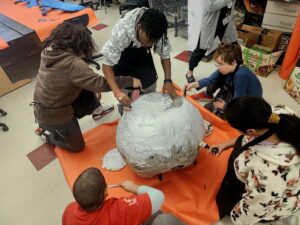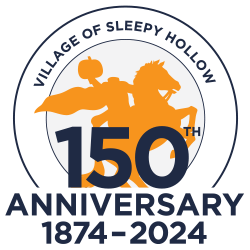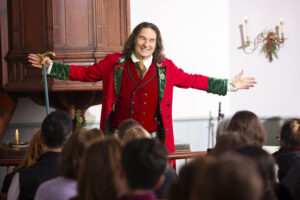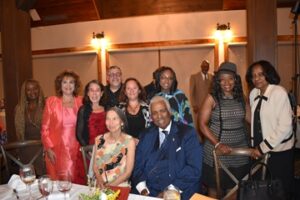
in the celebration to promote inclusion
for all people with differing abilities. Photo by Jane Lawrence
To celebrate our 150th anniversary, the Village of Sleepy Hollow is holding monthly commemoration events. For March, a float dedicated to the history of the village will be included in the annual St. Patrick’s Day parade on March 10.
Using paper mache, the sculpture class of Sleepy Hollow High School teacher Jane Lawrence, with help from Ms Dreher‘s art club and Ms Mastrosimone’s special needs students, will create giant pumpkins, our iconic lighthouse and waves representing the Hudson River. A silhouette of the horseman will be featured along with a very glittery green “150” to celebrate our birthday on St. Patrick’s Day.
“Sleepy Hollow is my home and being able to work on this community celebration with my students makes it all the more special,” Lawerence said.
The Irish Experience in Sleepy Hollow
During the mid-19th century, several Irish families settled in our community. Once the hamlet of Beekmantown began to be divided up into residential lots by Cornelia Beekman, and later her son Stephen, many of these families moved into the triangular neighborhood bounded by Beekman Avenue, Cortlandt Street and Clinton Street. Most of these residents were parishioners at St. Teresa’s Church. By the 1870s many of the Irish residents were significant supporters of the incorporation of the Village of North Tarrytown.
 In 1854, James and Mary Sinnott moved to the community and their four sons became influential in both religious and civic affairs. George Sinnott was one of the incorporators of the Village of North Tarrytown and served as one of the first trustees. He was also a charter member of the Fire Patrol.
In 1854, James and Mary Sinnott moved to the community and their four sons became influential in both religious and civic affairs. George Sinnott was one of the incorporators of the Village of North Tarrytown and served as one of the first trustees. He was also a charter member of the Fire Patrol.
Michael Sinnott, another supporter of Village incorporation, was the Superintendent of the Ambrose Kingsland estate for 16 years. His wife Katherine was a charter member of the Women’s Relief Corps and affectionately called “Aunt Kate” by residents of the Village. Patrick Sinnott served both as a trustee of the School District No. 1 and of St. Theresa’s Church.
A few of the many influential Irish families include the Murphys and the Martins. Michael Murphy was also one of the incorporators of the Village of North Tarrytown and later his grandson, Daniel, became the Chief of Police for the Village. Edward Martin was the school principal and then served as President of the Village of North Tarrytown (1918-20) and later Mayor (1935-1943).
Many Irish residents were also members of the Ancient Order of Hibernians and its Ladies Auxiliary. In the 1970s, the members sponsored Irish Cultural Day on Beekman Avenue.
The first Annual Sleepy Hollow St. Patrick’s Day Parade took place in . . . 1997!








“Teresa”, not “Theresa”. Get it right!
Calm down Kevin. Some people – contributors and editors – actually do occasionally make a mistake.